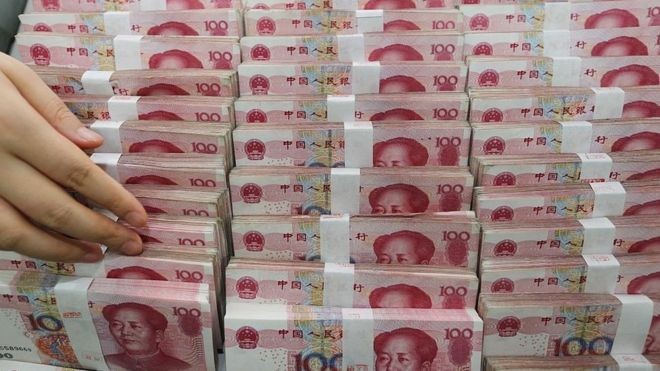
Bloomberg reports that China is seen keeping its deep pockets open in the second half and through 2017, despite having front-loaded spending earlier this year, as fiscal policy takes over from broad monetary easing as the major prop to growth. The central government's fiscal deficit will surpass the target of 3 percent of gross domestic product set for 2016, according to economists surveyed by Bloomberg News. The broader shortfall that wraps in revenues from land sales, policy banks and other channels will also sink deeper into the red...The fiscal tap is seen remaining well and truly open, in part to compensate for an on-hold monetary stance as policy makers shift from all out stimulus to reigning in asset bubbles..."The Chinese authorities have become more cautious with regard to monetary policy, given the prevailing issues around capital flows and exchange rate uncertainty," said Arjen van Dijkhuizen, senior economist at ABN Amro Bank NV in Amsterdam. "The shift in focus from monetary to fiscal stimulus is in line with the policy recommendations of G20, which China is chairing this year."
- The Diplomat prints that in recent remarks, Japanese Defense Minister Tomomi Inada reiterated the Japan Maritime Self-Defense Force's (MSDF) intention to continue cooperation with the United States in the South China Sea...Inada outlined three particular areas where Japan will continue to deepen its involvement in the South China Sea: Japan on its part will increase its engagement in the South China Sea through, for example, Maritime Self Defense Force joint training cruises with the U.S. Navy, bilateral and multi-lateral exercises with regional navies, as well as providing capacity building assistance to coastal nations...Beijing recently warned Tokyo that it would risk China's wrath by engaging in freedom of navigation patrols (FONOPs) in the region. Tokyo's resolve to intensify its maritime involvement in the South China Sea demonstrates the continuing salience of the region for Japanese strategy despite Japan's lack of geographic proximity to the area. Not only does Tokyo benefit from the preservation of free navigation in the South China Sea, but Japan, as a net importer of fossil fuels, is dependent on open sea lanes across the Asia-Pacific for its energy needs.
- Reuters reports that average new home prices in China's 70 major cities rose 9.2 percent in August from a year earlier, accelerating from a 7.9 percent increase in July, an official survey showed on Monday. Compared with a month earlier, home prices rose 1.5 percent, quickening from July's 0.8 percent, according to Reuters calculations from data issued by the National Bureau of Statistics (NBS). Home prices in the coastal city of Xiamen and inland city Hefei had the biggest surge, rising 43.8 percent and 40.3 percent respectively, from a year ago. Shanghai and Beijing prices rose 31.2 percent and 23.5 percent.
- 2016-09-14 How China Wastes Its Renewable Energy
- 2016-09-13 Behind China’s Firewall, Google Maps Shows Nine-Dash Line
- 2016-09-12 Marriage Falls in China, Transforming Finances and Families
- 2016-09-11 China, Russia naval drill in South China Sea to begin Monday
- 2016-09-09 North Korea’s Nuclear Defiance Leaves China With Few Options
- 2016-09-08 Pressing Asia Agenda, Obama Treads Lightly on Human Rights
- 2016-09-07 Tensions over South China Sea belie summit cordiality
- 2016-09-06 Global leaders test limits of spreading wealth
- 2016-09-05 Seeking smoother summit, ASEAN to skirt mention of South China Sea ruling
- 2016-09-04 China, US talks 'extremely productive'
- www.bbc.com China business confidence rises again
- Reuters China's central bank sees some success in cutting interbank lending risk
- Reuters China to invest $450 billion modernizing agriculture by 2020
- Bloomberg BIS Warning Indicator for China Banking Stress Climbs to Record
- Financial Times China's ports hit hard by global trade slowdown
- Reuters China third quarter business confidence index increases from second quarte...
- New York Times 28 Dead, 15 Missing After Typhoon Lashes Eastern China
- CNBC China's US Treasuries holdings hit lowest since 2013
- The Washington Post China punishes local officials after grisly village killings
- Bloomberg Tom Vilsack: China Is Our Number One Customer
- New York Times Chinese Companies Open Checkbooks to Acquire European Tech
- Bloomberg Alarm Bells Over China Bank Stress
- Bloomberg China's Fulida to Buy 17% of Australian Cattle Exporter Wellard
- Forbes The Number Of Jobs Lost To Trade With China Is Zero, Zip, Nada
- nationalinterest.org China Is Supporting Syria's Regime. What Changed?
- www.npr.org For US Minority Students In China, The Welcome Comes With Scrutiny
- nationalinterest.org China's Military Is Getting Strong (So Why Aren't Chinese Weapons Selling?)
- www.nbcnews.com China and North Korea: Nuclear Tests Highlight Complex Relationship
- www.wired.com Why Trump's Tough Talk on China Won't Change a Thing
- The Diplomat China to Receive 4 Su-35 Fighter Jets From Russia in 2016
